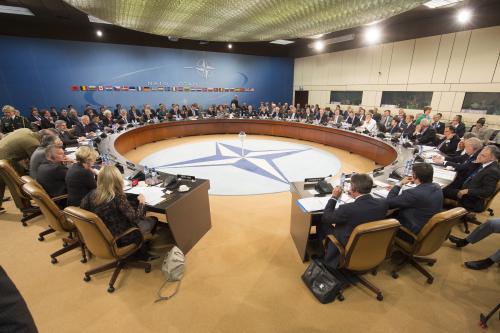 From Severin Carrell, Guardian: Senior Nato officials have warned Alex Salmond’s government that an independent Scotland would be barred from joining Nato if there were any disputes over the basing of nuclear weapons on the Clyde.
From Severin Carrell, Guardian: Senior Nato officials have warned Alex Salmond’s government that an independent Scotland would be barred from joining Nato if there were any disputes over the basing of nuclear weapons on the Clyde.
The Guardian can reveal that a small group of Scottish civil servants travelled to Nato HQ in Brussels last month to discuss Scotland’s options for joining the alliance if Salmond wins next year’s independence referendum. They argued that an independent Scotland should be given special treatment because it was already a significant part of an existing, founder member of Nato, the UK.
It is understood that Nato officials said it might be possible to allow Scotland to start fast-track talks – but in a blow to Salmond’s anti-nuclear strategy, the Scottish delegation was also told that no new member would be allowed to join Nato if that state had unresolved military or territorial disputes with other countries.
Under article 10 of the Nato treaty, one assistant general secretary of Nato said at the meeting on 6 July, new applicants also have to show a history of stable defence policies and structures as a minimum entry requirement. Article 10 also implies that every Nato member accepts the alliance’s nuclear first-strike policy.Official sources in Edinburgh and London confirm that these issues were seen as coded warnings that the Scottish government’s determination to close down the Trident nuclear submarine base at Faslane on the Clyde would be a major obstacle to Scotland’s application.
Lord Robertson, a former secretary general of Nato and a defence secretary in Tony Blair’s government, said Romania, Hungary and Bulgaria were expected to resolve disputes over Transylvania and crossings over the Danube before starting their Nato membership process.
“You’re not expected to import problems with your neighbours into Nato and that’s a very clear warning signal,” Robertson said. He said Faslane’s continued operations were integral to Nato’s strategic concept. . . .
Nato officials stressed that any decision on accepting new members would be political, requiring a unanimous decision by member states, adding to the pressure on Salmond over resolving any conflicts on defence policy with the UK.
From Simon Johnson, Telegraph: In a further setback, it is understood their arguments that a separate Scotland should be treated as a special case were rejected, with Nato confirming it would have to apply from scratch and the process normally takes a minimum of two to three years.
Michael Moore, the Scottish Secretary, confirmed the UK Government facilitated the meeting and it had proved that a separate Scotland “can’t apply to join Nato and then disregard the fact that it is a nuclear alliance.”
He added: “The Scottish Government’s plans for Nato appear to be in serious disarray. . . .”
A Nato spokesman said the talks were “informal and informational” but said the content was private.
However, he confirmed that it is “widely agreed” that an independent Scotland would have to apply from scratch as a new state and the procedure was outline in Article 10.
Image: Scottish delegation travelled to NATO HQ to discuss Scotland's options for joining the Alliance (photo: NATO)
